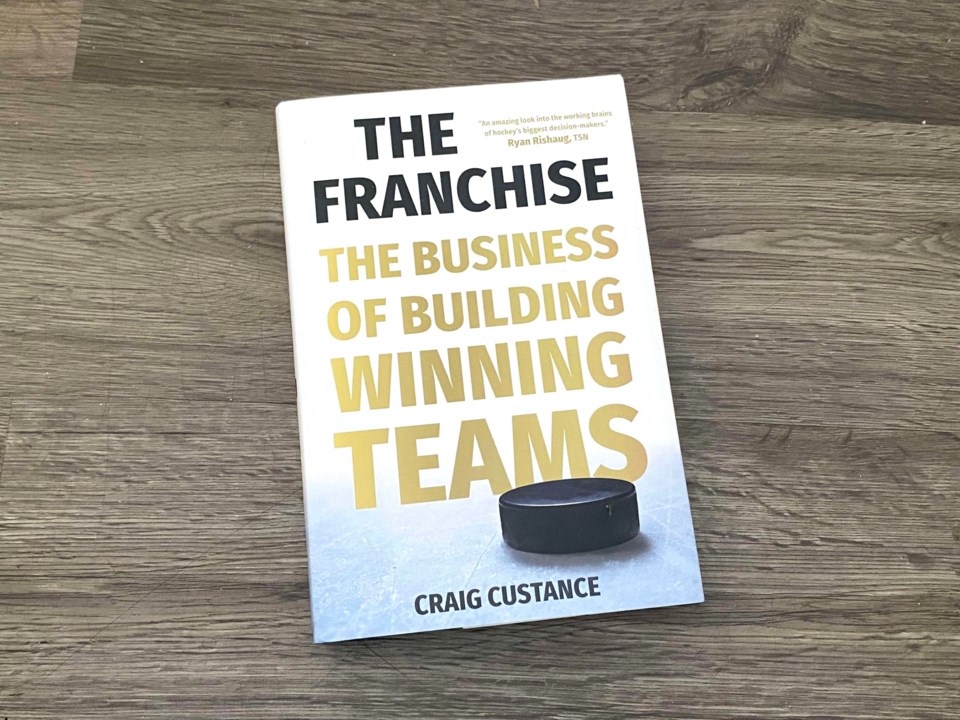YORKTON - We watch hockey as fans and cheer on the players fully expecting them to collectively determine which team will win and which will lose the game.
But author Craig Custance suggests in his recent book that while players score and save goals there are far more people involved in the process of wins and losses than those wearing the game jerseys.
In The Franchise from publisher Simon & Schuster, Custance puts forward the very reasonable hypothesis that to create a winning team you need an organization which collectively has a desire to win and a willingness to make the decisions to achieve that goal.
It makes sense of course when you think about it that a team’s success is an inter-connected effort from an owner who works to make sure he has the best management team.
And when you think hockey, that management team is hugely important from the obvious of having a coach who can motivate players and instill winning systems, to the ‘brain trust’ which determines who to draft, what trades will net the best returns, all focused on building ‘a team’ within the framework of a salary cap which forces moves based on dollars not skill.
In the book Custance, best known as a writer for the The Athletic, “delves into the stories about the people who make the biggest decisions in hockey. For more than three years, Custance travelled far and wide to connect with the inner circle of hockey, from the owner’s suite of the Carolina Hurricanes, to a private championship ring ceremony with the Vegas Golden Knights, to a country club for a breakdown of the Pittsburgh Penguins. He had frank conversations with new Leafs’ GM Brad Treliving and former Leafs’ GM Kyle Dubas, and discussed the revolution in women’s hockey with three-time Olympic medal winner and Devils’ executive Meghan Duggan,” notes the publisher website.
It is a process that took years in terms of collecting the material.
Custance told Yorkton This Week he wanted to talk with people away from the usual hockey arena interview setting.
So interviews often happened in what might be thought of as unusual places; a bookstore, over pickle ball or dinner.
Custance, also the author of Behind the Bench: Inside the Minds of Hockey’s Greatest Coaches, said to get that sort of access was in large part what helped create the depth in the book, allowing time to delve deeper into the thoughts of those he interviewed.
“Having access to people like this . . . the opportunity to connect with these people in a different way was so important,” he said.
What the time allowed were to see the more human side of the game, said Custance. He said people who have to make the big decisions do not do things lightly, or without thought.
“They can struggle over firing a coach for weeks,” he said, adding that often comes with not sleeping well as the decision is made.
But a common thread of the most successful is a willingness to make the decision to best benefit the team – and they get it right more often than most.
In the book Custance provides insights into the mindset of such ‘winners’ with stories behind notable trades and huge free agent signings, and insights into how some of the most successful teams of the last two decades were built.
“There are never-been-told details about trade demands, a prominent hire that one general manager regretted immediately, and how one general manager risked his life to sign a player he thought could change the course of his NHL team,” notes the publisher page.
Within the book which is very much focused on the NHL Custance said there are commonalities among the most successful that people involved in all levels of the game or even other sports or in business can mimic.
There are things which “can be a take away,” said the author, adding coming from a family of teachers he feels is an important aspect of the book.
“It was 100 per cent my goal,” he said, adding he feels for those “running a team, or a business” there are some lessons within the book.
While The Franchise is a chance for readers to gain some new perspective on why some teams win and others struggle, it will be a ‘self-help’ for coaches and others too, which makes it a more intriguing hockey read than many books out there.






